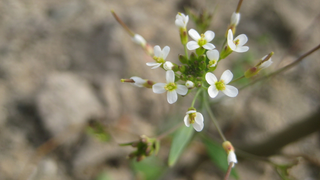Genetic changes that crop up in an organism’s DNA may not be completely random, new research suggests. That would upend one of the key assumptions of the theory of evolution.
Researchers studying the genetic mutations in a common roadside weed, thale cress (Arabidopsis thaliana), have discovered that the plant can shield the most “essential” genes in its DNA from the changes, while leaving other sections of its genome to build up more alterations.
“I was totally surprised by the non-random mutations we discovered,” lead author Grey Monroe, a plant scientist at the University of California, Davis, told Live Science. “Ever since high-school biology, I have been told that mutations are random.”
Related: Unraveling the human genome: 6 molecular milestones
Random mutations are an important part of the theory of evolution by natural selection, in which mutations give rise to adaptations that are passed on to offspring and alter their chances of survival. Scientists have assumed that these mutations were random and that the first step in evolution by natural selection was, therefore, also random. But this may not be entirely true, the new study suggests.
“The idea of random mutation has been around for over a hundred years in biology and is something you hear so often as a student that it is easy to take it for granted,” Monroe said. “Even as a practicing geneticist and evolutionary biologist, I had never seriously questioned the idea.”
The new finding does not disprove or discredit the theory of evolution, and the researchers said randomness still plays a big role in mutations. But the study does show that these genetic alterations are more complex than scientists previously believed.
DNA errors
There are plenty of chances for genetic mutations and even errors to occur during the life of an organism.
“DNA is a fragile molecule; on average, the DNA in a single cell is damaged between 1,000 and 1 million times every day,” Monroe said. “DNA also has to be copied each time a cell divides, which can introduce copying errors.”
Luckily for humans and all other organisms, our cells can counteract a lot of this damage. “Our cells are working constantly to correct DNA and have evolved complex molecular machines, DNA repair proteins, to search for mistakes and make repairs,” Monroe said.
However, DNA repair proteins are not a foolproof solution and cannot fix all mistakes. “If damage or copying errors are not repaired, they cause a mutation, a change in the DNA sequence,” Monroe said.
There are two main types of mutations: somatic mutations, which cannot be passed on to offspring, and germline mutations, in which offspring can inherit the DNA error from a mutated gene in a parent. Germline mutations are what fuel evolution by natural selection and become more or less common in a population based on how they affect the carrier’s ability to survive.
Not all mutations have the potential to alter an organism’s chances of survival. Mutations cause major changes to an organism only when they occur in genes — sections of DNA that code for a particular protein. Most of the human genome is made of non-gene DNA, Monroe said.
Non-random pattern
In the new study, researchers decided to test the randomness of mutations by investigating whether mutations were happening evenly between gene and non-gene regions of DNA in the genomes of thale cress.
Thale cress is a “great model organism” for studying mutations because its genome has only around 120 million base pairs (for comparison, the human genome has 3 billion base pairs), which makes it easier to sequence the plant’s DNA. It also has a very short life span, which means that mutations can rapidly accumulate across multiple generations, Monroe said.
Over three years, the researchers grew hundreds of plants in laboratory conditions for multiple generations. In total, the researchers sequenced 1,700 genomes and found more than 1 million mutations. But when they analyzed these mutations, they found that the parts of the genomes containing genes had much lower rates of mutation than non-gene regions.
“We think it is likely that other organisms could also have non-random genetic mutations,” Monroe said. “We have actually been following up with our study by investigating this question in other species and are finding results that suggest non-random mutation is not unique to Arabidopsis.”
However, the researchers suspect that the level of non-randomness among different species may not be the same.
Protecting essential genes
The non-random pattern in mutations between gene and non-gene regions of DNA suggests that there is a defensive mechanism in place to prevent potentially disastrous mutations.
“In genes coding for proteins essential for survival and reproduction, mutations are most likely to have harmful effects, potentially causing disease and even death,” Monroe said. “Our results show that genes, and essential genes in particular, experience a lower mutation rate than non-gene regions in Arabidopsis. The result is that offspring have a lower chance of inheriting a harmful mutation.”
Researchers found that to protect themselves, essential genes send out special signals to DNA repair proteins. This signaling is not done by the DNA itself but by histones, specialized proteins DNA wraps around to make up chromosomes.
“Based on the result of our study, we found that gene regions, especially for the most biologically essential genes, are wrapped around histones with particular chemical marks,” Monroe said. “We think these chemical marks are acting as molecular signals to promote DNA repair in these regions.”
The idea of histones having unique chemical markers is not new, Monroe said. Previous studies into mutations in cancer patients have also found that these chemical markers can affect whether DNA repair proteins fix mutations properly, he added.
However, this is the first time these chemical markers have been shown to influence genome-wide mutation patterns and, as a result, evolution by natural selection.
Potential implications
The researchers hope their findings could eventually be used to make improvements in human medicine.
“Mutations affect human health in so many ways, being a cause of cancer, genetic disease and aging,” Monroe said. Being able to protect certain regions of the genome from mutations could help prevent or treat these problems, he added.
However, more research into animal genomes is needed before researchers can tell if the same non-random mutations occur in humans. “Our discoveries were made in plants and do not give rise to new treatments,” Monroe said, “but they change our fundamental understanding of mutation and inspire many new research directions.”
The researchers also think the chemical signals given off by essential genes could be used to enhance gene-editing technologies that could help us create crops that are more nutritious and resilient to climate change, Monroe said.
The study was published online Jan. 12 in the journal Nature.
Originally published on Live Science.

